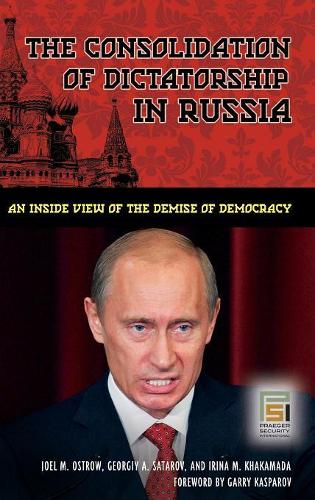
The Consolidation of Dictatorship in Russia: An Inside View of the Demise of Democracy
(Hardback)
Publishing Details
The Consolidation of Dictatorship in Russia: An Inside View of the Demise of Democracy
By (Author) Joel M. Ostrow
By (author) Georgiy A. Satarov
By (author) Irina M. Khakamada
Bloomsbury Publishing PLC
Praeger Publishers Inc
30th October 2007
United States
Classifications
General
Non Fiction
320.947
Physical Properties
Hardback
184
Description
The still-prevailing notion among Western powers, including the United States, is that Russia is a democracy, or at least that it remains in the process of democratization. Nothing could be further from the truth, as Ostrow, Satarov, and Khakamada demonstrate in The Consolidation of Dictatorship in Russia. Journalists critical of Vladimir Putin's dictatorship, such as Anna Politkovskaya, are murdered. Nearly 100 investigative journalists, an average of two per month, have been murdered since Putin took power, and not one person has been charged or convicted of those crimes. In this book the authors seek to explain not just how Russia has become a dictatorship, but why Russia's leaders made the choices that undermined democratic political development, something no book has done until now. The still-prevailing notion among Western powers, including the United States, is that Russia is a democracy, or at least that it remains in the process of democratization. Nothing could be further from the truth, as Ostrow, Satarov, and Khakamada demonstrate in The Consolidation of Dictatorship in Russia. Journalists critical of Vladimir Putin's dictatorship, such as Anna Politkovskaya, are murdered. Nearly 100 investigative journalists, an average of two per month, have been murdered since Putin took power, and not one person has been charged or convicted of those crimes. Others critical of or in opposition to Putin often meet the same fate, as in the suspicious poisoning in London of Aleksandr Litvinenko. How did Russia manage to transition from dictatorship to dictatorship, when the hopes for democracy were so great and when Western conventional wisdom assumed for so long that democracy was inevitable there The Consolidation of Dictatorship in Russia answers that question. Georgiy A. Satarov was President Boris Yeltsin's chief political counselor for much of the 1990s, and in that capacity was inside the Kremlin and present when most of the decisions this book details were made. Irina M. Khakamada was a Deputy in the Russian State Duma, a Deputy Speaker in the parliament, held a cabinet-level position in the government, and most recently was Putin's main liberal opponent in the 2004 presidential election. These individuals are among Russia's most prominent democratic activists and were participants in the events that led Russia away from the path of democratization. They share a unique perspective and knowledge of what happened and why. The authors seek to explain not just what Russia did and the consequences of those decisions, but why Russia's leaders made the choices that undermined democratic political development, something no book has done until now.
Reviews
Coauthors Ostrow (Benedictine Univ.), Satarov (Information for Democracy Foundation, Moscow), and Khakamada (former People's Deputy, Russian State Duma) are highly critical of the current state of Russian political development. It is no coincidence that Gary Kasparov, a former world chess champion who became part of the opposition to the present government in Russia, wrote a foreword to this extremely one-sided, anti-Putin book. One of the major points of this study is that dictatorship in Russia has emerged. The authors argue that the word democracy is irrelevant to what Russia is today. For instance, the volume considers recent Russian elections window dressing. It also emphasizes erosion of press freedom and lack of fair access to mass media for different political groups. The book complains about the regime's human rights abuses and points to law and order as Putin's major priority. The book is valuable to researchers and faculty because it contains a comprehensive assessment of modern Russia from a liberal perspective. Recommended. Research and professional collections. * Choice *
[W]ell written and easily readable. It should be welcomed by Russia experts and observers. * The Russian Review *
Author Bio
JOEL M. OSTROW is Chair of the Political Science Department at Benedictine University in Lisle, Illinois. He is a tenured Associate Professor of Political Science specializing in Russian politics, democracy and democratization, nationalism and terrorism, war, political violence, global affairs, and international organizations. He is the author of Comparing Post-Soviet Legislatures (2000). GEORGIY A. SATAROV is co-founder and President of the INDEM (Information for Democracy Foundation), a Moscow think tank. From 1991 to 1993 he served on Russian President Boris Yeltsin's President's Council, which served as an advisory board to the President, and from 1993 to 1998 he was senior Political Advisor (including duties as President's Liaison to the Russian State Duma). He heads a large project grant on the study of corruption in government (see www.anti-corr.ru) and is Co-President of the All Russian Civic Congress. He is widely published on Russian political affairs. IRINA M. KHAKAMADA served three terms as a People's Deputy to the Russian State Duma from 1993 to 2003. In the Duma she served on the Committee on the Economy, the Budget Committee, and as a member of the Russian delegation to the Parliamentary Assembly of the Council of Europe. She served in numerous leadership positions in the Duma, including as Deputy Speaker from 2000 to 2003. In 1997, she served as the Director of the State Committee for the Development of Small Enterprise and as a member of the Government Committee on Economic Reform. In 1999, she headed the State Committee on Entrepreneurship. Prior to her political career, she founded several businesses and served on the Board of Directors of the RTSB, the largest Russian stock exchange.
